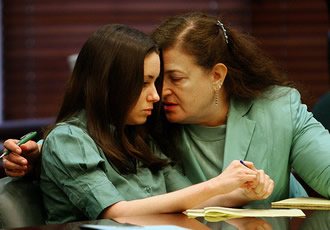Lord, Have Mercy:
What's Wrong About Being Right
For Sunday October 24, 2010
Lectionary Readings (Revised Common Lectionary, Year C)
Joel 2:23–32 or Jeremiah 14:7–10, 19–22
Psalm 65 or Psalm 84:1–7
2 Timothy 4:6–8, 16–18
Luke 18:9–14
Last summer I read a book by Andrea Lyon called Angel of Death Row; My Life as a Death Penalty Defense Lawyer (2010). In 1995 the Chicago Tribune dubbed Lyon the "angel of death row" for her fourteen years of service in the Cook County Public Defender's Office, where she eventually became Chief of the Homicide Task Force. Lyon describes herself as an unapologetic "defender of accused killers" and "an archaeologist of social despair, unearthing, layer by layer, my clients' descent into criminal jeopardy."
A defender of convicted killers? Yes, and as I read I kept thinking how "gospelly" her story felt. Lyon introduces a dozen or so defendants who make the "robbers, evildoers and adulterers" of Luke 18:11 look like boy scouts — killers like Lonnie Fields, who murdered a judge and an attorney in a courtroom before twenty-seven witnesses, or Casey Anthony, who was accused of killing her own toddler.
Lyon never romanticizes her clients, excuses their crimes, fudges the truth, or idealizes her work. But as a defender of the unrighteous whom the righteous love to hate, she believes that "every person amounts to more than the worst thing he or she has ever done." She's argued more than 130 homicide cases. In nineteen cases she defended clients who were found guilty of capital murder, arguing that they be spared the death penalty in favor of a lesser punishment. She won all nineteen cases.
 |
Andrea Lyon. |
Lyon's story fits perfectly with Luke's parable of the Pharisee and the tax collector (18:9–14). By contrasting two characters as polar opposites, Jesus sets in bold relief two ways of being religious. One way is death-dealing, the other is life-giving.
The Pharisee was religiously righteous, the tax man extorted revenue for the Roman oppressors. The religious expert was smug, sanctimonious, and confident, the outsider was anxious, insecure and timid. The saint paraded to the temple, while the sinner "stood at a distance" as if his physical distance from the sacred temple expressed his spiritual alienation. The righteous man stood up, the sinful man looked down. In an act of shocking narcissism, the Pharisee prayed loudly "about himself"; the tax collector could barely pray at all. The Pharisee puffed out his chest in pride; the publican beat his breast in sorrow.
As in so many Jesus stories that subvert conventional wisdom, the parable punch line culminates with a reversal. The respectable, reputable believer, so competent and accomplished, the one who had done everything right, was rejected, whereas the secular sinner — disreputable, inadequate, and incompetent — "went home justified before God."
It's hard to imagine a more earnest, conscientious, religious person than the Pharisee. He prayed often, he fasted regularly, and he gave generously to help the needy. His spiritual regimen was stringent. But he made two tragic mistakes in his religious life, one about himself, and one about other people, the combination of which is toxic to authentic spirituality.
First, the Pharisee "looked down on everybody else." Contempt for others lurks in the human heart, bubbling up all too easily and frequently. "I'm glad I don't have tattoos like that guy. . . . Thank God I'm not as narrow-minded as that conservative Republican." We imagine that in denigrating others we validate ourselves, or that at least we will compare favorably. To disparage criminals like those in Lyon's book might feel good, but that's a dark place that Jesus warns us to avoid. We harm people when we do this to them. Even worse, while imagining that we elevate ourselves, we harm our own selves.
"We all stumble in many ways" (James 3:2), and for many reasons. What we all need when we flounder and fail is not moral condescension but human compassion, not humiliation but empathy, not shame but hope. I've always loved the tender wisdom of St. Maximos the Confessor (seventh century): "The person who has come to know the weakness of human nature has gained experience of divine power. Such a person never belittles anyone…He knows that God is like a good and loving physician who heals with individual treatment each of those who are trying to make progress."
The flip side of condescension toward others is justification of yourself. This was the Pharisee's second mistake. The Pharisee thanked God that he was "not like other people" — a thief, an evildoer or an adulterer. His religious narcissism was a form of spiritual self-justification, of which there are almost endless permutations. It's scary to think about the many ways we try to justify ourselves before God, others, and our own selves.
 |
Lyon and defendant Casey Anthony. |
We'll invoke almost anything to justify ourselves — intelligence (GPA and SAT), alma mater ("This is where I went to school thirty years ago"), money ("I'm frugal toward myself and generous to others"), family ("Great kids!"), sports ("I'm in shape, you're a slob"), politics ("My vote is enlightened, yours is ideological"), and work ("I work at X; what do you do?"). A common form of self-justification invokes your zip code ("Where do you live?"), a transparent insinuation that net worth equals self worth. Ethical self-justification assures me that "I'm better than the next person."
To a greater or lesser degree I've tried these versions of self-justification; they don't work. Society is relentless in demanding proofs and justifications from us, and it's easy to take the bait, especially if you're an accomplished person with lots of ammunition who — in all modesty, right? — can rise to the challenge. The fourth-century desert saint John the Dwarf once observed, "We have put aside the easy burden, which is self-accusation, and weighed ourselves down with the heavy one, self-justification."
To live without self-justification makes me feel vulnerable and naked. But when you think about it, living without self-justifications is extraordinarily liberating. As soon as you accept that you're accepted by a good God, you never, for any reason, need to prove yourself. To get to that place, Jesus says that we need only seven words — those mumbled by the tax collector as he stood at a distance and stared at the ground: "God, have mercy on me, a sinner." The moment we breathe those words and cast our unadorned selves upon God, we experience his love without conditions or limits.
Correctly understood, and spoken from the heart, that's the most important prayer anyone can utter, and in a sense the only prayer you'll ever need. Why? Because it proceeds from a clear-eyed appraisal of our human condition and, more importantly, from confidence in the character of a God who welcomes the secular sinner — and even the self-righteous saint.
For further reflection
* The early monastics on judging others: "The monk, says Moses, must never judge his neighbor at all in any way whatever." "They said of Abba Macarius that just as God protects the world, so Abba Macarius would cover the faults he saw, as though he did not see them, and those he heard, as though he did not hear them."
* Consider Mrs. Turpin from the short story "Revelation" by Flannery O'Connor. Mrs. Turpin was a good, decent, upright, and proud woman who did everything right, except that she was a self-righteous racist. She was a person, writes O'Connor, who when she entered heaven needed "even her virtues burned away."
* Meditate on The Place Where We Are Right by Yehuda Amichai (1924–2000), considered by many to be Israel's greatest modern poet.
From the place where we are right
Flowers will never grow
In the spring.
The place where we are right
Is hard and trampled
Like a yard.
But doubts and loves
Dig up the world
Like a mole, a plow.
And a whisper will be heard in the place
Where the ruined
House once stood.
From http://en.wikipedia.org/wiki/Yehuda_Amichai: Yehuda Amichai
Image credits: (1) DePaul University and (2) West Orlando News Online.





